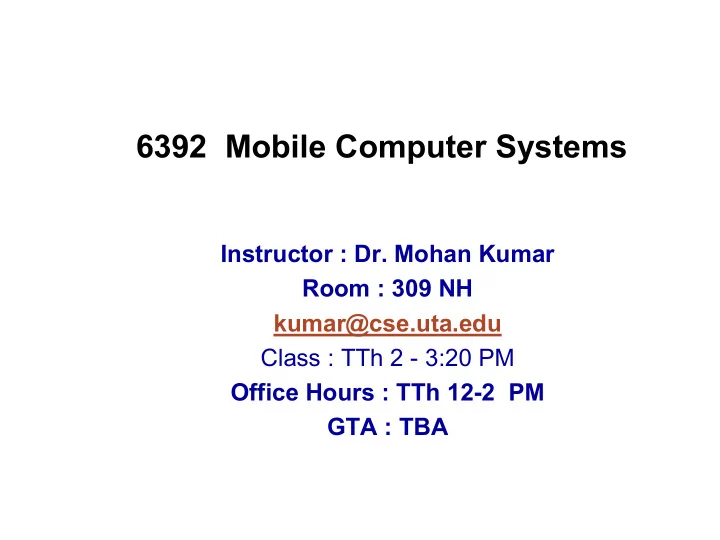

6392 Mobile Computer Systems Instructor : Dr. Mohan Kumar Room : 309 NH kumar@cse.uta.edu Class : TTh 2 - 3:20 PM Office Hours : TTh 12-2 PM GTA : TBA
All email messages SUB: CSE6392 Kumar CSE@UTA 2
Course Description Syllabus: Mobility management, Mobile IP, hand-off, routing, multicasting, and reliable communication in wireless networks. Data management, push-pull based data acquisition, issues in wireless mobile systems, resource allocation, QoS issues and multimedia transmission over wireless, Pervasive computing and information access. The objective of this course is to give an insight into the world of mobile computing and wireless networks. Issues with regard to ubiquitous information access from a wireless network will be discussed. Prerequisites: Graduate level course/s (at least one in each) in Computer Networks and Operating Systems Kumar CSE@UTA 3
� Active participation in discussions, seminars and debates is mandatory for this course. � All components include some weight for class participation - absence and/or passive presence will seriously affect your grade. � All participants will be required to review research articles and/or operating system implementations. � Term paper topics, teams and project/debate topics will be identified by random selection. Kumar CSE@UTA 4
You will be required to write two papers term paper is based on individual work project/debate paper involves team work Kumar CSE@UTA 5
Assessment Course grades will be based on the following: Term Paper: 30% Topic will be assigned 4 weeks prior to your presentation Written paper due 72 hours prior to presentation Project and Debate: 40% (groups of 4) Topics and Teams will be assigned during Week 3 or 4 Written paper due 72 hours prior to presentation Demonstration during last week of semester Class Participation : 10% Homework and Assignments : 20% Kumar CSE@UTA 6
Term Paper : Paper Preparation 10-12 pages (including references) Font size : not less than 11 Margins : 1 inch all around References : at least 15, at most 1 pg in font size 10. use IEEE style Format Title Abstract Introduction Main theme in 2/3 sections Conclusions and Discussions Kumar CSE@UTA 7
Term Paper: Presentation Time : 20 Minutes (NO MORE!, NO LESS THAN 15 Minutes) + 5 Minutes of Q&A Class participation is very important Presentation Title Outline Problem State of the art Solutions, problems, challenges (15-20 slides) Conclusions Kumar CSE@UTA 8
Term Paper: Assessment Written Paper (30%) Technical content, Organization, Technical writing, Critical assessment, References (citing) Presentation (30%) Organization, breadth/depth, adherence to time, Q & A Class assessment (20 %) Assessment by classmates Class participation (20%) Your assessment of other seminars, Q&A Kumar CSE@UTA 9
Project/Debate : Assessment Project work – 40 % Paper – 20% Debate – 40% Class – 20% Participation – 20% Kumar CSE@UTA 10
Homework and Assignments Four Topics Lectures Seminars Debates Kumar CSE@UTA 11
Organization http://cse.uta.edu/~kumar/cse6392 Aug-mid oct and Paper Discussions mid-oct-nov : Seminars and Debates 3 seminars /day 25 + 25 + 25 1 Debate /day 20 + 20 + 10 +10 29 Sessions Aug 27, 29 10 sessions for Sep 3,5,10,12,17,19,24,26 seminars and 4 for Oct 1,3,8,10,15,17,22,24,29,31 debates Nov 5,7,12,14,19,21,26 Dec 3,5 Kumar CSE@UTA 12
General Notes The instructor reserves the right to modify course policies, course calendar, and assignment or project values and due dates If you require any accommodation based on disability, please meet with the instructor in the privacy of his office the first week of the semester to be sure you are appropriately accommodated All students are expected to be responsible users of the computer systems for this course Kumar CSE@UTA 13
General Notes (Contd.) All students are expected to pursue their academic careers with honesty and integrity. Academic dishonesty includes, but is not limited to, cheating on a test or other course work, plagiarism (offering the work of another as one’s own), and unauthorized collaboration with another person. Students found guilty of dishonesty in their academic pursuits are subject to penalties that may include suspension from the university. Students are encouraged to discuss homework with classmates, but are not allowed to copy the solutions of others or share solutions with others. All work turned in for grading must be the student’s own work. Kumar CSE@UTA 14
General Notes (Contd.) A public access course website will be used as a repository for all course material. This directory will contain copies of any homework assignments, course handouts, project and paper lists, notes etc. Students are expected to obtain accounts on any university computers needed for this class, and to be able to access the course repository and send and receive e-mail messages. Kumar CSE@UTA 15
General Notes (Contd.) Academic dishonesty includes PLAGIARISM. If any of the papers you submit are found to be plagiarized, you may be penalized according to University policies. Seminars/Debates will not be rescheduled (provide proof for unavoidable circumstances) Kumar CSE@UTA 16
Recommend
More recommend